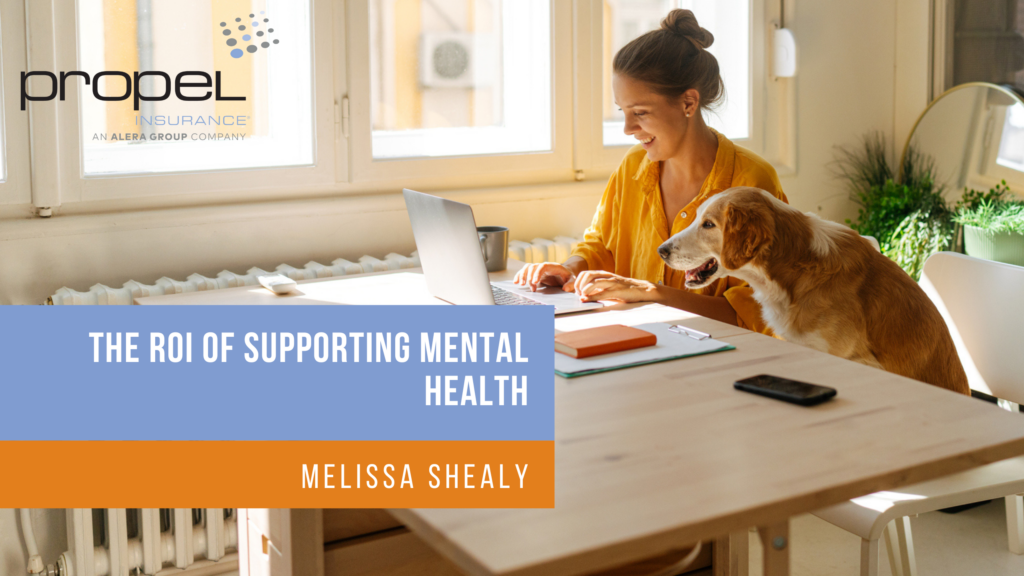Propel provides innovative insurance solutions to thousands of companies across the country. We make it our business to know your world inside and out.
Employee Benefits, Insights
The ROI of Supporting Mental Health
Does it seem like everyone’s talking about mental health these days? The topic has been receiving considerable attention, and it’s not just a passing fad. People are stressed and many are dealing with mental health challenges. Employees increasingly expect mental health support from their employers. The ROI of supporting mental health makes this a win-win solution.
Mental Illness and Substance Abuse Are Common
Mental illness and substance abuse likely affect at least some portion of your workplace. According to Mental Health America, 23% of adults experienced a mental illness between 2021 and 2022. That’s nearly 60 million Americans. Mental illness and substance abuse often co-occur – Mental Health America says 18% of Americans experienced substance abuse disorder in the past year and 77% of them did not receive treatment.
Mental illness takes many forms, with conditions ranging from mild to severe. According to the National Alliance on Mental Illness (NAMI), 19.1% of U.S. adults suffer from anxiety disorders, 8.3% from major depressive episodes, 3.6% from post-traumatic stress disorder, and 2.8% from bipolar disorder.
The Business Impact of Mental Illness
Since many people with mental illnesses are employed, it’s important to understand the connection between work and mental illness.
According to Berkeley Executive Education, poor mental health at work may be associated with high turnover rates, frequent sick days, teams struggling to meet targets, and stress or burnout. The World Health Organization (WHO) says 12 billion working days are lost due to depression and anxiety every year, costing businesses $1 trillion in lost productivity.
It’s not a one-way street – mental health may impact work productivity, but work may also impact mental health. The CDC says workers suffering from work-related stress may feel sad, tired, overwhelmed, or burned out, lack motivation, and have trouble sleeping and concentrating. Workers suffering from burnout may also be vulnerable to anxiety and depression, be less engaged at work, and decide to quit.
Employees Want More from Their Employers
Workers are increasingly vocal about their mental health needs and expect their employers to support them. A Calm survey found that 70% of Gen Zers and Millennials expect employers to help them reduce their stress and anxiety. However, only about one in three employers offer this kind of support.
Employers that don’t offer mental health support may lose out on talent. According to the American Psychological Association (APA), 81% of survey respondents said an employer’s support for mental health will be an important factor when they are looking for work in the future.
The ROI of Mental Health Support
Deloitte says mental health issues result in direct costs (such as higher healthcare costs) as well as indirect costs (such as absenteeism, presenteeism, and turnover). By providing better mental health support, employers control these costs.
According to Talkspace, research suggests that employers could see an ROI of $4 for every $1 they invest in mental health. Core savings come from medical savings, time savings, and reduced absenteeism.
What Should Employers Do?
Employees are entitled to some mental health support by law. The Department of Labor (DOL) says employees can use FMLA leave for mental health conditions and may be entitled to reasonable accommodations and discrimination protections under federal law. Furthermore, under the Mental Health Parity and Addiction Equality Act, health benefit plans that provide mental health or substance use benefits cannot impose more restrictions than what apply to comparable medical or surgical benefits.
Despite mental health parity requirements, only 30% of workers in the APA survey said their employers offer health insurance with mental health and substance use disorder benefits. Among those who said their employers offer this coverage, 93% said it was effective mental health support. For this reason, offering health insurance with mental health benefits is a logical place to start.
Beyond health insurance, other employee benefits may be useful, such as:
- Employee Assistance Programs. Employers can offer support for mental health, substance abuse, and common stressors through Employee Assistance Programs (EAP).
- Remote Counseling. During the COVID-19 pandemic, remote mental healthcare became more common. An expert in telepsychology and digital mental health who spoke to the APA said telepsychology is considered just as effective as in-person treatment and has higher retention rates.
- Flexible hours and remote work options help workers manage busy schedules and reduce stress.
Workplace culture also plays a role. Although there has traditionally been a stigma around mental illness, Calm found that 72% of Gen Z workers want to be able to talk openly about mental health in the workplace. Workers may thrive in a more open culture that embraces self-care and shows support for others.
Getting Started
Helping your workers tackle their mental health may be easier and less expensive than you think. For example, many plans include mental health benefits at no extra cost, meaning increased awareness and employee education may be all you need. Additionally, Propel’s parent company, Alera Group, has a mental health toolkit that all our clients can access.
If you want to take the next step to access all the resources available to you, reach out to Melissa Shealy for assistance at melissa.shealy@propelinsurance.com or 803-263-1452.

Melissa has spent an impressive 28 years in the insurance industry, specializing in Employee Benefits. She and her team are dedicated to tailoring benefit solutions that meet the unique needs of both companies and their employees.More about Melissa...


